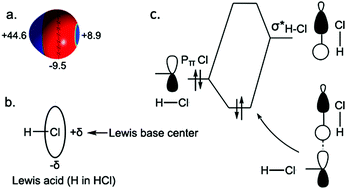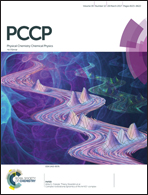Emergence of novel hydrogen chlorides under high pressure†
Abstract
HCl is a textbook example of a polar covalent molecule, and has a wide range of industrial applications. Inspired by the discovery of unexpected stable sodium and potassium chlorides, we performed systematic ab initio evolutionary searches for all stable compounds in the H–Cl system at pressures up to 400 GPa. Besides HCl, four new stoichiometries (H2Cl, H3Cl, H5Cl and H4Cl7) are found to be stable under pressure. Our predictions substantially differ from previous theoretical studies. We evidence a high significance of zero-point energy in determining phase stability. The newly discovered compounds display a rich variety of chemical bonding characteristics. At ambient pressure, H2, Cl2 and HCl molecular crystals are formed by weak intermolecular van der Waals interactions, and adjacent HCl molecules connect with each other to form asymmetric zigzag chains, which become symmetric under high pressure. In H5Cl, triangular H3+ cations are stabilized by electrostatic interactions with the anionic chloride network. Further increase of pressure drives H2 dimers to combine with H3+ cations to form H5+ units. We also found chlorine-based Kagomé layers which are intercalated with zigzag HCl chains in H4Cl7. These findings could help to understand how varied bonding features can co-exist and evolve in one compound under extreme conditions.



 Please wait while we load your content...
Please wait while we load your content...